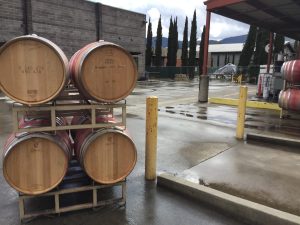Although, at first sight, winemaking might appear to be one of the most idyllic of occupations, it is an industry with its own serious safety concerns. The fermentation process that produces the highly desirable end product, whether it be a serious earthy, rich, Cabernet Sauvignon or a sweet, slightly decadent, Moscato, also produces a lot of carbon dioxide. In the realm of 40 times the volume of grape juice in fact. That is a lot of carbon dioxide and the health implications of that amount of fatal gas cannot be ignored.
Dizziness, headaches, shortness of breath and increased heart rate are just some of the symptoms of raised workplace CO2 levels. Asphyxia, convulsions, and coma are the more serious possibilities, plus of course other accidents related to over exposure can occur – even drowning. This is why accurate and rapid monitoring of CO2 is so important throughout a winery, acknowledging both how localised areas of high gas concentration can build up and the way that the gas diffuses. Workers with jobs that involve them operating over open fermentation vessels may be particularly at risk thanks to CO2 gas build up and Oxygen exclusion, but less obvious risks occur such as a night time build up of gas because of decreased ventilation through door openings.
Exposure limits for carbon dioxide in the State of Washington are 30,000 ppm as a short-term exposure limit averaged over any 15-minute work period and 5000 ppm as averaged over an eight-hour work shift. The National Institute for Occupational Safety and Health indicates 40,000 ppm (4%) as being immediately dangerous to life and health.
The Louis M. Martini Winery located in St. Helena, California is one of the original five Napa Valley wineries founded in 1933 after Prohibition was repealed. They produce many of the wines that have made the California vineyards so famous. As such the Louis M. Martini Winery is a very popular stop on the Napa Valley wine tasting circuit. The need to ensure the safety of visitors, and, of course, their own employees, has ensured that the Louis M. Martini Winery has taken CO2 monitoring very seriously. This is why the Louis M. Martini Winery has invested in Edinburgh Sensor’s Guardian gas monitors. We have supplied six Guardian CO2 monitoring units, initially the Guardian Plus units, followed in 2011 by Guardian NG infrared gas monitors units in the winery barrel rooms and other particularly important places where CO2 levels are the most critical.
The Guardian NG monitors provide near-analyser quality with continuous CO2 sampling, measurement and display of target gas concentrations for detection level ranges of between 0 – 3000 ppm and 0 – 100% by volume. The Guardian NG wall-mounted monitors are easy to install and can detect gases from sampling points up to 30 metres away. The robust plastic IP54 rated enclosures prevent the ingress of water and particulates in this busy working environment. Graphical display of historic readings is possible for any period the winery may be interested in and data is easily transferred via an on board RS232 interface with optional Ethernet interface with relay outputs for control of external devices.
Like all of our sensor and monitoring ranges these Guardian NG monitors offer a winning combination of low maintenance and long-term stability. These particular units have been in continuous operation since installation and are linked to a comprehensive alarm and door closing system to alert staff and management if CO2 levels should ever reach levels of concern.

